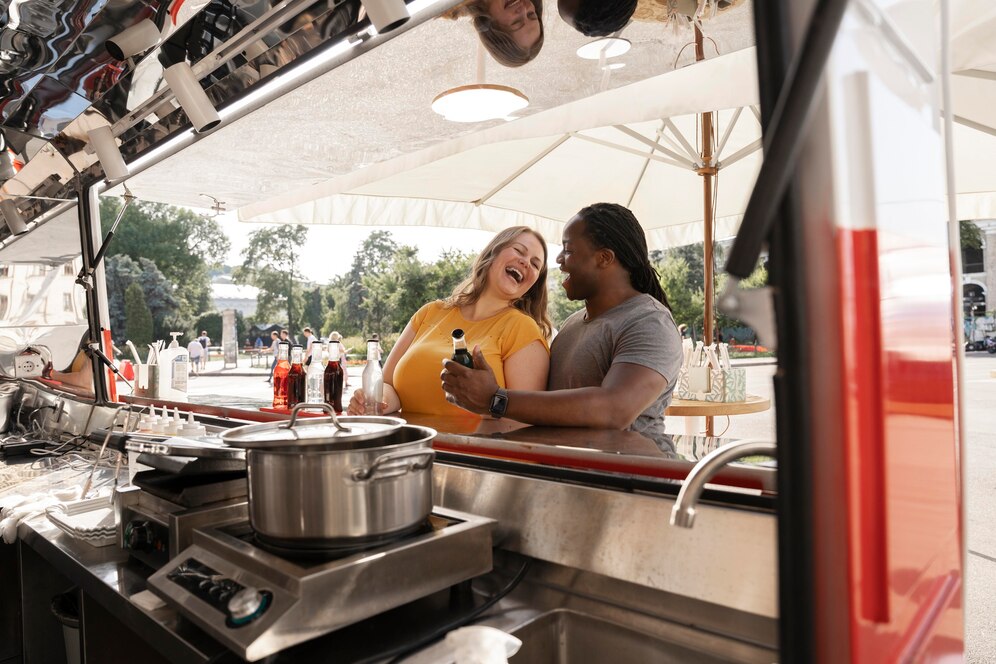
Mobile Pizza Catering: The Perfect Solution for Any Event
March 17, 2025Promotional vehicles and food trucks for social programs and public services
April 20, 2025Introduction
The food truck industry has seen significant growth in recent years, offering entrepreneurs a unique and exciting way to enter the food business without the high costs of opening a traditional restaurant. Whether you’re an aspiring chef, a seasoned restaurateur looking to expand your brand, or an event planner needing a mobile kitchen, food truck rental provides a cost-effective and flexible solution. Instead of committing to the financial burden of purchasing a food truck outright, renting allows you to test your concept, build a customer base, and gain experience with minimal risk.
With the increasing popularity of street food, festivals, and mobile catering, renting a food truck has become a viable business opportunity. However, before making a decision, it’s essential to understand the benefits, challenges, and factors to consider when renting a food truck. In this comprehensive guide, we will walk you through everything you need to know about food truck rental, helping you make the best decision for your business.
Why Choose Food Truck Rental?
One of the primary reasons to opt for food truck rental instead of purchasing is the significantly lower initial investment. A brand-new, fully equipped food truck can cost anywhere between $50,000 and $200,000, which is a substantial amount for new entrepreneurs. On the other hand, renting allows you to start your business for a fraction of the price, reducing financial risk and allowing you to allocate funds toward other crucial aspects, such as marketing and ingredients.
Another significant advantage is flexibility. Renting a food truck provides the opportunity to test different markets, locations, and menus without being tied down to one specific setup. If one concept doesn’t perform well, you can pivot your business model without incurring significant losses. Additionally, food truck rental is an excellent option for seasonal businesses, event-based catering, or restaurant owners who want to explore mobile food service without committing to long-term ownership.
Maintenance and regulatory compliance are other areas where renting offers benefits. Food trucks require regular maintenance to keep them in working condition, and owners must navigate various licensing and health code regulations. When you rent a food truck, many of these responsibilities fall on the rental company, saving you time and effort. This allows you to focus on perfecting your menu, engaging with customers, and growing your business.

Key Considerations When Renting a Food Truck
Before committing to a food truck rental, it’s important to evaluate several factors to ensure that the truck you choose aligns with your business needs.
The first thing to consider is the type of food truck you need. Not all food trucks are designed the same way, and depending on your menu, you may require specialized equipment. If you’re serving fried foods, a truck equipped with deep fryers is essential. If your concept revolves around gourmet sandwiches, a truck with a griddle and prep area is more suitable. Some rental companies provide fully customized food trucks, while others offer basic setups that you must modify according to your needs.
Cost is another crucial factor. Rental rates vary depending on the truck’s size, equipment, and the duration of the rental period. Some companies charge daily, weekly, or monthly fees, while others offer long-term leasing options. Beyond the base rental price, be sure to inquire about hidden fees, such as cleaning charges, maintenance costs, and insurance. Understanding the total cost upfront will help you budget effectively.
Speaking of insurance, make sure you understand the coverage provided by the rental company. Some companies include insurance in their rental package, while others require you to obtain your own liability and vehicle coverage. Ensuring that your rental agreement includes adequate insurance protection will safeguard your business from unforeseen incidents.
Branding and customization are also important considerations. Your food truck is not just a kitchen on wheels—it’s a marketing tool. Some rental companies allow you to wrap the truck with your branding, while others may only offer generic designs. If you want to make a lasting impression and attract customers, investing in a branded truck can significantly boost your business’s visibility.
Lastly, research local regulations regarding food trucks. Each city has specific zoning laws, parking restrictions, and health department requirements. Some rental companies assist with permitting and compliance, which can be a major advantage, especially if you’re unfamiliar with local regulations.
How to Find the Best Food Truck Rental Service
Finding the right food truck rental company is essential for the success of your business. Start by researching local providers and comparing their offerings. Look for companies with positive reviews, transparent pricing, and experience in the industry. A reputable rental provider should have well-maintained trucks, flexible rental terms, and excellent customer support.
Before signing a rental agreement, inspect the food truck thoroughly. Ensure that all kitchen equipment is functional, the vehicle is in good condition, and there are no hidden damages. A clean and well-maintained truck will minimize the chances of unexpected breakdowns, ensuring smooth operations.
Additionally, inquire about support and maintenance services. A reliable rental company should provide assistance in case of technical issues. Ask whether they offer emergency roadside service or a replacement truck if something goes wrong. This can save you from major disruptions, especially during peak business hours.
Finally, read the rental contract carefully. Pay attention to terms related to deposits, cancellation policies, mileage limits, and repair responsibilities. If anything is unclear, ask for clarification before committing to the rental. Being well-informed about your agreement will help prevent misunderstandings later on.
Maximizing Success with Your Food Truck Rental
Once you’ve secured a food truck rental, the next step is maximizing its potential.
Location is one of the most critical factors for success. Research high-traffic areas such as downtown districts, office parks, college campuses, and special events where food trucks are in demand. Some cities have designated food truck zones, while others may require permits to operate in certain locations. A strategic location can significantly impact your sales and customer base.
Your menu should be optimized for efficiency. Unlike traditional restaurants, food trucks operate in a fast-paced environment with limited space. A simple yet appealing menu that allows for quick preparation and service will help you maximize revenue. Additionally, using high-quality ingredients and offering unique dishes can set your food truck apart from the competition.
Marketing plays a key role in attracting customers. Utilize social media to announce your location, showcase menu items, and engage with followers. Platforms like Instagram, Facebook, and Twitter are great for building a loyal customer base. Encouraging user-generated content, such as customer reviews and food photos, can further enhance your brand’s visibility.
Expanding your revenue streams is another way to boost profitability. Many successful food truck owners offer catering services for private parties, corporate events, and weddings. If your rental truck is equipped for catering, consider advertising Wood fire pizza catering or similar services to attract more bookings. Catering gigs can provide steady income beyond your daily street sales.
Challenges and How to Overcome Them
Running a food truck comes with its own set of challenges. Weather conditions can impact sales, especially in areas with extreme climates. To mitigate this, consider having backup indoor catering options or operating in covered locations.
Competition is another hurdle. With the growing number of food trucks, standing out is crucial. Focus on offering unique dishes, excellent customer service, and a memorable brand experience. Engaging with your community and participating in food festivals can also help build your reputation.
Finally, staying compliant with regulations is essential. Food truck laws can change frequently, so stay informed and maintain good relationships with local authorities to ensure smooth operations.
Conclusion
Food truck rental is an excellent way to break into the mobile food industry without the high costs and risks of purchasing a truck. It offers flexibility, affordability, and convenience, making it a great option for new entrepreneurs and established business owners alike.
By carefully selecting the right rental provider, optimizing your menu, choosing strategic locations, and leveraging marketing, you can turn your food truck venture into a thriving business. The street food industry continues to grow, and with the right approach, your food truck can become a local favorite.
If you’re ready to take your food business on the road, securing a reliable food truck rental is the first step toward success.



